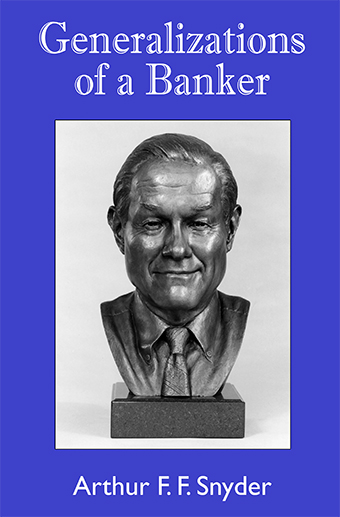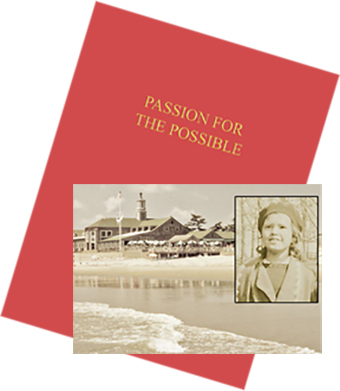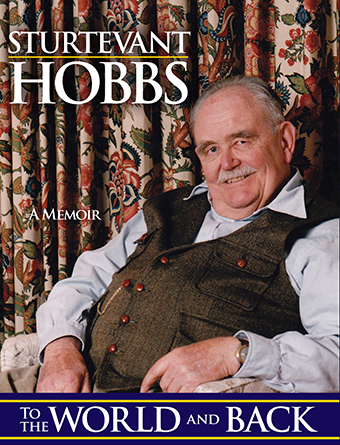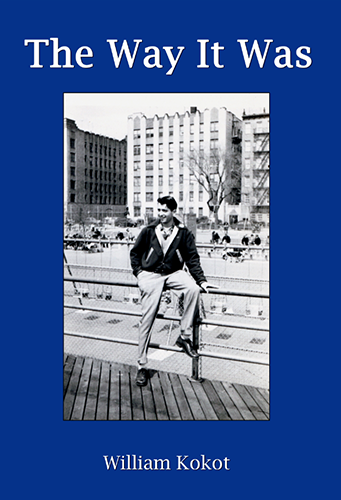
“A Banker Like My Father”
All the interviews were with New England businessmen—only men—except this one with Doris Kearns Goodwin, the presidential historian and author. It took weeks to arrange the interview because Doris was in great demand during the presidential campaign. After the interview, I was anxious about sending Doris my edits. After all, she had won a Pulitzer! Her reply was, “This is absolutely terrific. You made my wandering comments sound put together! Thanks so much.” She didn’t change a word.

Doris Kearns Goodwin is a Pulitzer Prize-winning author and historian, NBC News analyst, former assistant to President Lyndon Johnson, and lifelong baseball fan.
In the mid-1980s, I was working on The Fitzgeralds and The Kennedys, a book that eventually took me ten years to write. I was finishing the book at the Boston Athenaeum, working on the top floor of that beautiful five-story neoclassical building across from the State House on Beacon Hill. The reading room is surrounded by balconies of books—it’s a glorious place to write! My husband and I were living on Beacon Hill just for a year, so I was working there rather than in our house.
It is often the case that a publisher’s advance doesn’t last until the book is done, so there was a period of time when I was still writing without a regular salary coming in. It was during that period that Arthur lent us some money. Once the book was published, we were able to pay back the loan.
It seemed to me that the most important criteria he looked for in deciding whom to loan to was the character of the person. That was more important, in many ways, than the balance sheet or the amount of collateral they could put forth. He liked to get a sense of who the person was. In turn, I got a sense of him, and we became friends.
Arthur’s office was near the Athenaeum, so he would just stop by sometimes to say hello, ask how I was doing, and we’d talk for a little while. He would ask about my writing, how I got into it, and why I liked doing what I was doing. By showing interest in my writing, he got a sense of the passion that I had for my work. Those conversations probably told him a great deal about our ability to use the loan wisely and pay it back in a timely fashion, because he trusted that I loved the work I was doing. He obviously loved what he was doing, so I think he understood that if you really had a passion for what you were doing, it was also more likely everything was going to work out well.
I felt like he was part of my project, not simply some anonymous banker who loaned us money. We felt somehow responsible to him, to make sure everything came out right. We also developed a good relationship, and there was that sense of connection between us. At times, he invited us to go sailing with him on that incredible boat of his, and we got to know his wife, Jean, as well.
I felt that he was like the neighborhood banker in the old days who was a central figure in the community. My father was a bank examiner on Long Island, so I knew that world of banking when I was a little girl. That world changed with the advent of large banks that focused on mergers and acquisitions. In these transactions, you might not even know who your banker is. In some ways, Art Snyder reminded me of what it was like in those earlier days. He really saw the role of a banker as one who helps people.
“Swimming in a Hurricane”

In September 1938, with one week left before it was time to go back to school, I bicycled down on a lovely fall day to the Dunes Club for one last swim. Everyone had gone back to work or to school so no one else was on the beach at ten o’clock in the morning. The waves were enormous and challenging, and the skies along the horizon took on a strange, ominous mixture of pink with layers of orange and gray.
It had been a wonderful summer and having turned the age of fourteen that year, I had become quite a proficient swimmer, so I could hardly wait to fly up on those big waves and ride down from the dizzying heights, up and down, up and down. It was not an act of bravado that impelled me to run into the surf, but it was a desire to be carefree and a determination to explore the high waves, these bigger than ever!
As I ran into the surf, I stepped on something soft and unrecognizable. I reached down and brought up a dead seagull. Without a thought, I tossed it aside and rode up on that mammoth wave, down again, and then up. The next wave crashed on me, sweeping me further and further out into the swells. With the following wave, I was swirled, almost weightless, along with sand and shells, into a green room under the sea. Fighting for a breath of air, I struggled to the top, caught again by forces beyond my control. Unbeknownst to me, my friend’s mother, Mrs. Dawley, was standing on the lawn of the Dunes Club watching my white bathing cap heading further and further out to sea. She hurried inside and called the nearby Coast Guard station in Point Judith, who, fortunately, was monitoring the storm. They saw me, came after me, caught up with me, and dragged me over their gunnels and into their boat, minus bathing suit and cap, thoroughly chastised.
The Hurricane of 1938 was very unexpected; nobody was warned that there would be such a powerful and horrific storm at that particular time. Millions of trees were knocked down, thousands of homes destroyed, and in Rhode Island alone, nearly 400 people lost their lives. In downtown Providence you can still see plaques on the sides of buildings showing where the water reached a height of eleven feet. Everything was awash—all the cars and all the signs.
The Dunes Club was totally destroyed. There was nothing left of the buildings but piles of sticks. Later we found our little beach cabana tossed on its side, nearly a mile away on Narrow River. The interesting thing was that the mirror was still on the hook! And I had heard of someone from Watch Hill who rode out the storm on a door torn loose from a house, and he survived. It just shows you how some things can manage through wind and storm.
There was no warning in advance of the approach of this hurricane and I was fortunate to survive this experience. To tell the truth, I still remember the exhilaration and bravado as an adventurous teenager riding up and down on those enormous waves until the unhappy recognition of my plight became obvious. I have always been adventurous and independent, but this experience has engendered a gratitude to God that knows no bounds.
“Wooing Oona”

Imust properly set the stage before relating a humiliation that makes my first day at Tabor Academy pale by comparison. Shakespeare said, “Entertain conjecture of a time.” Well, the time was the winter of 1941, just a few years after the annual debutante balls became a bit of a competitive event. Every season, one of the young lovelies would be anointed “Debutante of the Year.” The names Brenda Diana Duff and Kelly Frazier spring to mind. Kelly was a magnificent brunette, whose picture graced the cover of every magazine.
Being number-one debutante of the year was a big thing in those days. It was at the height of the popularity of Life magazine. Therefore, it was inevitable that Life would use their platform to publicize the glittering social events of the time. One of their most popular sections was called “Life Goes to a Party,” and it was just what it sounds like. They’d feature various exotic parties and were always looking for an original twist.
Well, at that time, my brother Whit was living and working in New York. He and his former college roommate stayed in the roommate’s family home, a residence large enough that they had extra rooms that were occupied by other young people seeking fame in the big city. My brother later married his roommate’s sister, so the house hummed with a bit of romantic potential.
The resident who most captured my imagination, romantic or otherwise, was none other than the daughter of Eugene O’Neill, America’s foremost playwright. The whole Debutante of the Year business was in its third year of operation, and Oona O’Neill had recently been crowned with that honor. Since her father was married to an actress, I think she found the burden of living in a very tumultuous household sufficiently disruptive that she chose to take a room in the brownstone also occupied by my brother. And there she was, living between Madison and Park, at 52 East 66th Street, in a house I could visit at will.
I got the big bright idea that I would invite Oona to the junior prom at Tabor. I just knew the editors at Life would be unable to resist covering the story of the Debutante of the Year attending a prep school dance on the arm of one of its more enterprising students: me. Talk about Life Goes to a Party! I was certain I’d come up with an irresistible storyline. Why, it sounded perfect. But first, of course, I had to arrange to meet Oona and get her acquiescence in the plan.
I had recently started smoking, and intended to rely on this sign of my worldliness to dazzle and impress my prospective date. After an exchange of introductions in the drawing room, the staff retreated to the basement and my brother’s roommate and his family disappeared upstairs. I’m certain all were listening intently to see how the encounter was going.
Oona was lovely, just unbelievably lovely, and I made certain I displayed my most brilliant, most fascinating self. I was terribly debonair, terribly international. Pulling out my tobacco pouch, I tamped the leaf into the bowl of the pipe with a marvelous little silver implement. Regaling Oona first with one story and then another, I paced back and forth in front of where she was seated on the sofa. I was showing off like crazy. After about five minutes of tamping down the leaf and gesturing to make my points, I finally took out the matches to light the pipe.
As luck would have it, the very force with which I struck the match sent this flaming torch arching over Oona’s shoulder and down behind the cushion on the sofa. My God, in only a second or two, the sofa and the pillows were on fire. All hell broke loose! New York brownstones had no running water on the first floor. No bathrooms. No kitchen. So those who’d been listening so intently suddenly rushed onto the scene carrying pitchers of water up from the kitchen on the ground floor and glasses of water down from the bathrooms upstairs. Fire, water, pandemonium! This was absolutely the most humiliating moment of my life. Fortunately, I’ve never had another come even close to approaching it.
Well, of course, even before this happened, Oona was already a bit incredulous. She must have been thinking, “Who is this rube? Who is this ridiculous character posturing in front of me with all his histrionics?” Of course, once I’d set fire to the place, my attempts to woo her with my savoir-faire went up in smoke. Things had hardly calmed down before some greasy creature appeared at the front door to spirit Oona away to the Stork Club, and that was the last of my grandiose plan of taking Oona O’Neill to the junior prom.
About thirty years later, I saw Oona again. I was by now married to Chris, and we were in London visiting my parents. Following a night at the theater, my stepfather Henry and mother Helen had arranged for us all to have supper at the Savoy Grill. Seated at the table next to us were none other than Oona and her husband, Charlie Chaplin. She was still absolutely lovely, and seemed radiantly happy, despite the fact that Chaplin was old enough to be her grandfather.
God knows, they must have been happy. They had six children or something. Just seeing Oona again reminded everyone in our crowd of my notorious attempt to persuade her to attend Tabor Academy’s junior prom. Everyone was egging me to go over and reintroduce myself. “Oona, do you remember me from that famous afternoon on East 66th Street in New York when I set the sofa on fire?” Given that we’d been drinking, just one more martini might have inspired the necessary courage.
However, Charlie Chaplin was known for his mercurial moods. Caution, inspired in part by two very burly bodyguards seated alongside the other guests at his table, kept me from acting on this particular dare. I admit to being scared. I welched out. I was afraid that Chaplin would sic his gangsters, goons, or whatever they were, on me, and that would be the end. But I did, at least, get to see Oona again.
“Cheap Dates”

When Barbara and I started dating in the mid-1950s I didn’t have much money, so I tried to find things to do that didn’t cost a lot. We used to go to these Off, Off, Off, Off Broadway theaters down in Greenwich Village, which were by contribution only. So, we’d throw in a dollar bill. They didn’t know if it was a ten-dollar bill or a five-dollar bill or a one-dollar bill. Nobody knew. I remember one night we went to night court in New York where they’d bring in all these derelicts, prostitutes, bums—all kinds of stuff. Fascinating night!
Barbara thought that was really interesting. She thought it was really different because, apparently, this guy that she was going steady with was the entire opposite of that. He had a job, and money, and cars, and they went to nightclubs. I guess that wasn’t as interesting as meeting some guy who had to be creative about how to take a girl out without a lot of money in his pocket. All I could really afford was car fare for the subway. Car fare, by the way, was only fifteen cents.
